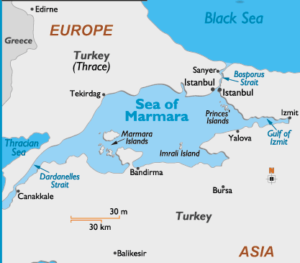In news
Recently, Turkey has launched a campaign to clean up sea snot in the Sea of Marmara
Key updates
- The thick slimy layer of organic matter, which looks like a viscous, brown and foamy substance, has spread through the sea south of Istanbul and also blanketed harbours and shorelines.
- The current outbreak in the Sea of Marmara is by far the biggest in the country’s history.
What is sea snot?
‘Sea snot’ is marine mucilage that is formed when algae are overloaded with nutrients as a result of water pollution combined with the effects of climate change. Phytoplankton thrive in warmer and nutrient-rich waters, and then discharge the snotty substance.
What are the causes for this problem?
- The nutrient overload occurs when algae feast on warm weather caused by global warming.
- According to environmental experts, overproduction of phytoplankton caused by climate change and the uncontrolled dumping of household and industrial waste into the seas has led to the present crisis.
- Dumping of sewage in the sea along with rising temperatures is causing the crisis.

Earlier incidents of sea snot
A ‘sea snot’ outbreak was first recorded in the country in 2007. Back then, it was also spotted in the Aegean Sea near Greece
Impact of the Sea Snot
Marine ecosystem
- The growth of the mucilage, which floats up on the surface of the sea like a brown phlegm, is posing a severe threat to the marine ecosystem.
- It has caused mass deaths among the fish population, and also killed other aquatic organisms such as corals and sponges.
- The mucilage is now covering the surface of the sea and has also spread to 80-100 feet below the surface.
- If unchecked, this can collapse to the bottom and cover the sea floor, causing major damage to the marine ecosystem.
- Over a period of time, it could end up poisoning all aquatic life, including fishes, crabs, oysters, mussels and sea stars.
Fishermen:
- The ‘sea snot’ outbreak has also affected the livelihoods of fishermen.
- The sludge is getting collected in fishermen nets, making them so heavy that they break or get lost.
- Moreover, the mucilage coating the strings makes the nets visible to fish and keep them away.
Health:
- Experts have warned that the ‘sea snot’ can cause an outbreak of water-borne diseases such as cholera in cities like Istanbul
Steps taken by Turkey in this regard
- Government of Turkey is planning to turn entire Sea of Marmara into a protected area
- Steps are being taken to reduce pollution and improve treatment of waste water from coastal cities and ship
- Turkey’s biggest maritime clean-up operation has been launched recently , and called on local residents, artists and NGOs to join hands to extend assistance.
- With this Turkey has planned to reduce nitrogen levels in the sea by 40%, which would help tackle the crisis.
















